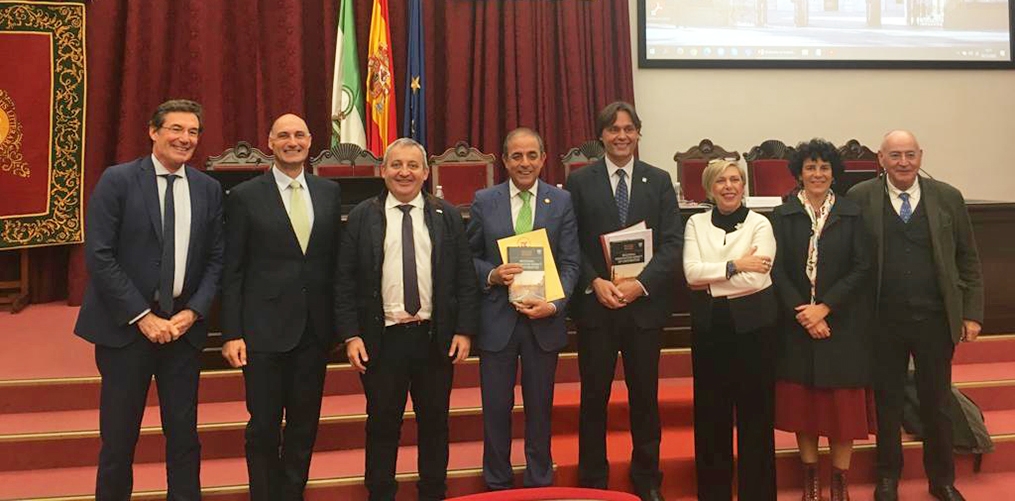
On Friday 2 December, European experts debated in the Auditorium of the University of Seville about the contribution of the university to regional development and how the promotion of innovation can benefit the double ecological and digital transition. The seminar, organised by the Joint Research Centre (JRC) of the European Commission and the universities of Seville and Pablo de Olavide, served as a stage for the exchange of knowledge on how the connection between universities and the other actors in the innovation system is essential to tackle challenges such as climate change, digitisation or water scarcity.
The Minister of University, Research and Innovation of the Junta de Andalucía, José Carlos Gómez Villamandos; the director of the JRC in Seville, Mikel Landabaso; and the rectors of the University of Seville and the Pablo de Olavide University, Miguel Ángel Castro Arroyo and Francisco Oliva Blázquez, participated in the seminar called ‘The contribution of the university to regional development through the promotion of innovation’.
In particular, examples were analysed of how collaboration between companies and universities is a characteristic of the most advanced regions in terms of innovation and job creation. In addition, the role of universities in the implementation of regional economic transformation strategies was discussed. For this, experts intervened such as Francisco Solé, vice president of the CYD Foundation; Luc Soete, former Chancellor of Maastricht University and co-chair of the S4 Scientific Commission; Koen Jonkers, editor-in-chief of the JRC; Karel Haegeman, team leader at JRC; Johan Stierna, JRC Lead Scientist; Antonia Jiménez, Vice-Rector for Research, Transfer and Doctorate at the Pablo de Olavide University, and Felipe Rosa, Vice-Rector for Knowledge Transfer at the University of Seville.
LifeWatch ERIC, which sets an example of promoting innovation through agreements with research centres and universities inside and outside Europe, attended this seminar. Juan Miguel González Aranda, LifeWatch ERIC Chief Technology Officer and Common Facility in Spain-ICT Core Director, reached out to the heads of the JRC and the main universities in Seville to expand cooperation in projects already underway.
The Councillor for University, Research and Innovation of the Junta de Andalucía, José Carlos Gómez Villamandos, highlighted that “the innovative capacity of academic institutions is linked to the flow of knowledge that they transmit to the business sector, and the degree of disruption that is implicit”. As an example of this, the Minister highlighted the Andalusia-Alentejo-Algarve University Innovation Centre CIU3A: a cross-border project promoted by the University of Seville, together with Portuguese higher education institutions, which will make it possible to take advantage of the opportunities associated with collaboration between the universities of both countries and to create international environments for R+D+I.
Miguel Ángel Castro, rector of the University of Seville, has stressed that “although much progress has been made in recent years, it is necessary to establish more synergies between the universities and other actors in the regional ecosystems to promote the innovation necessary for the profound transformation of regional production and consumption systems”. He has also referred to the European Universities initiative launched by the European Commission, in which the University of Seville is represented through Ulysseus European University. Castro recalled that this programme is being developed in parallel to the new European Innovation Agenda, is the aim of which is “to promote innovation as the engine of the ecological and digital transitions that Europe needs”.
Francisco Oliva, rector of the Pablo de Olavide University, expressed his admiration for “the important contribution that universities make to the social, cultural and economic development of our environment”; highlighting that “in the face of the challenges that society faces regarding digitisation and the ecological transition, universities contribute knowledge and act as transformative agents, generating alliances for innovation and training future generations”.
In the photo, from left to right: Mikel Landabaso, director of the JRC in Seville; Vincenzo Cardarelli, head of institutional relations at the JRC in Seville; Juan Miguel González-Aranda, LifeWatch ERIC Chief Technology Officer and Common Facility in Spain-ICT Core Director; Miguel Angel Castro Arroyo, rector of the University of Seville; Francisco Oliva, Blázquez, rector of the Pablo de Olavide University; Carmen Vargas, Vice Chancellor for Internationalisation at the University of Seville; Amapola Povedano, General Director of Employability and Entrepreneurship at the Pablo de Olavide University, and Francisco Solé Parellada, Vice President of the Knowledge and Development Foundation.